Hidden warranty codes can be your ticket to free repairs for life. These secret warranties, often communicated to dealerships through Technical Service Bulletins (TSBs), cover unexpected issues not included in standard warranties. By researching your vehicle's make and model, you can uncover hidden eligibility. Many automakers, like Ford and Hyundai, have extensive programs that provide significant savings. Keeping a detailed service history and VIN handy strengthens your claims. Don't miss out on potential benefits—there's much more to uncover about how to access these valuable codes and what they can mean for your wallet.
Key Takeaways
- Hidden warranty codes provide eligibility for free repairs or extended warranties not disclosed to consumers, often communicated through Technical Service Bulletins (TSBs).
- Approximately 500 secret warranties exist across various automakers, offering significant savings on unexpected repair costs.
- Researching specific vehicle makes and models can uncover applicable hidden warranty programs and associated benefits.
- Maintaining a detailed service history and documentation strengthens claims for repairs under hidden warranty programs.
- Engaging with dealerships using TSBs can facilitate access to secret warranties and potential goodwill adjustments.
Understanding Hidden Warranty Codes
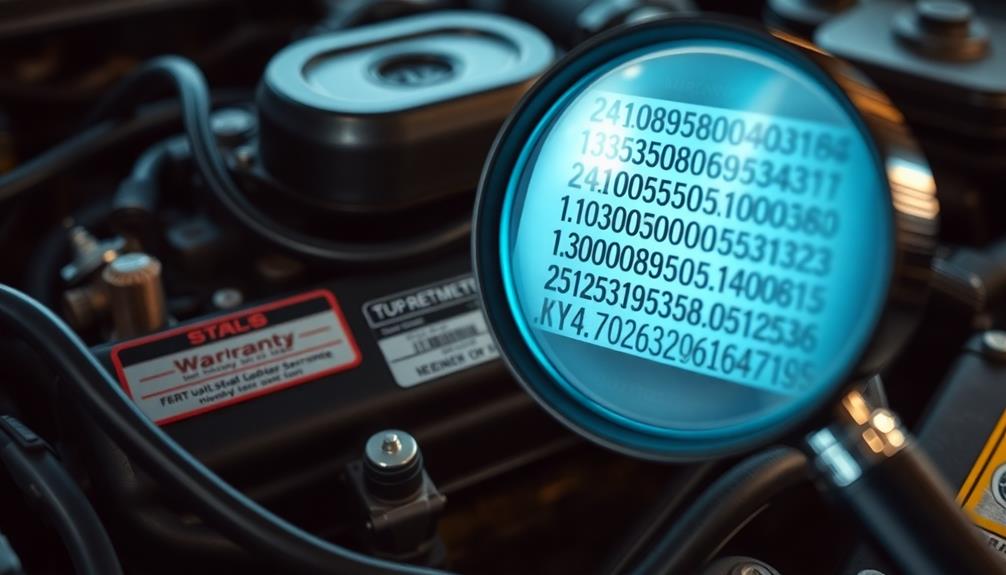
Hidden warranty codes can be a real game-changer for savvy vehicle owners. These codes, often referred to as "goodwill assistance" or "service actions," aren't publicly advertised but can reveal your eligibility for free repairs or warranty extensions on specific vehicle issues.
Manufacturers communicate known defects and remedies to dealerships through Technical Service Bulletins (TSBs), but they don't always inform you directly.
Right now, an estimated 500 secret warranties exist across various automakers, and knowing how to access this information can lead to substantial savings. To identify hidden warranty codes, start by researching your vehicle's make and model. Websites like nhtsa.gov provide access to TSBs that can guide you in uncovering potential benefits.
Additionally, participating in automotive forums can connect you with others who've shared their experiences and insights.
When you're ready to claim these benefits, make sure you have proper documentation. Keep your vehicle identification number (VIN) and service history handy, as these details are essential for ensuring successful repair outcomes.
Benefits of Secret Warranties
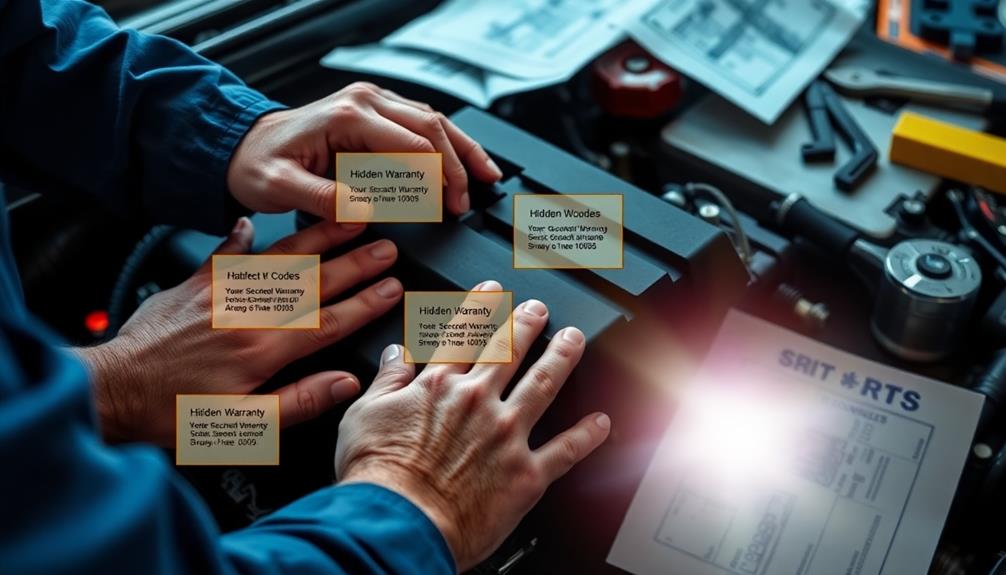
Secret warranties can save you a lot of money on unexpected repairs by covering issues not included in your standard warranty.
They often provide extended coverage that enhances your vehicle's reliability long after the original warranty period.
Cost Savings on Repairs
While many consumers may not realize it, tapping into hidden warranty programs can lead to notable savings on repair costs. Secret warranties exist for a reason—over 500 programs are available at any given time across various automakers, potentially covering millions of vehicles.
For instance, automakers like Ford and Hyundai have extended warranties remarkably, with Hyundai offering an impressive 15-year or 150,000-mile coverage for select models. This highlights the potential for considerable savings on repairs.
To maximize your chances of benefiting from these programs, familiarize yourself with technical service bulletins (TSBs). These bulletins provide insights into known issues that may be eligible for secret warranty coverage. By arming yourself with this information, you can discuss your vehicle's issues with dealerships more effectively.
Many consumers remain unaware of these hidden warranties, missing out on cost-free repairs for defects that could lead to high out-of-pocket expenses. Engaging with dealerships while referencing TSBs can facilitate access to these secret warranties, reducing repair costs and possibly even leading to goodwill adjustments, even after standard warranties have expired.
Don't let these opportunities pass you by—explore your options today!
Extended Coverage Benefits
Many drivers mightn't realize that extended coverage benefits can greatly ease the financial burden of unexpected repairs. Secret warranties, often overlooked, can provide you with free or discounted repairs for specific defects that arise after your standard warranty expires.
Knowing about these hidden warranties can save you thousands in repair costs, especially when manufacturers extend coverage for issues they don't publicly disclose.
For instance, Ford offered an 84-month warranty on certain EcoBoost engines in 2017-2019 models due to high claim rates. By researching your vehicle's make and model and checking for technical service bulletins (TSBs), you can uncover available extended coverage benefits.
Maintaining detailed records of your vehicle's service history is also essential, as it can strengthen your claim for repairs under these warranties.
Many car owners remain unaware of secret warranties, leading to significant missed opportunities for financial relief. By being proactive and informed, you can take advantage of these extended coverage benefits, ensuring that you get the service and support you deserve without the hefty price tag.
Don't let hidden warranties slip through your fingers—make sure to explore every option available to you!
Improved Vehicle Reliability
Understanding the financial benefits of hidden warranties directly ties into the improved reliability they offer for your vehicle.
Secret warranties often cover design defects and issues that might emerge after the standard warranty period, which can greatly enhance your vehicle's reliability. As a car owner, being aware of these secret warranties means you can avoid costly repairs, allowing you to maintain your vehicle's longevity without breaking the bank.
Manufacturers like Ford and Hyundai have implemented these programs as proactive measures to address common defects.
This not only leads to improved vehicle quality but also fosters trust in their products among car owners. When manufacturers extend warranties in response to high claim rates, it translates to better overall satisfaction for you and other drivers.
How to Identify Eligible Vehicles

Researching specific makes and models can reveal hidden warranty programs that might apply to your vehicle. Many manufacturers have undisclosed warranty extensions or secret warranties that can save you money on repairs.
To guarantee you're informed, you might also consider checking Virginia Arrest Warrants as they can indicate any potential legal issues tied to the vehicle's ownership.
Here's how to identify eligible vehicles:
- Explore Online Forums: Join automotive communities to find discussions about makes and models known for secret warranties.
- Check Manufacturer Websites: Look for announcements regarding warranty extensions or service actions that address common issues.
- Review TSBs on NHTSA: Technical Service Bulletins often detail known defects that may not be publicly advertised, but could qualify for warranty coverage.
- Document Your Service History: Keep a detailed record of your vehicle's repairs. Having this information handy can bolster your claim for any secret warranties, especially linked to known problems.
Additionally, engaging with consumer advocacy groups, such as the Center for Auto Safety, can provide invaluable insight.
They often have information on vehicles with secret warranties and can help you understand your rights as a consumer.
Common Examples of Secret Warranties
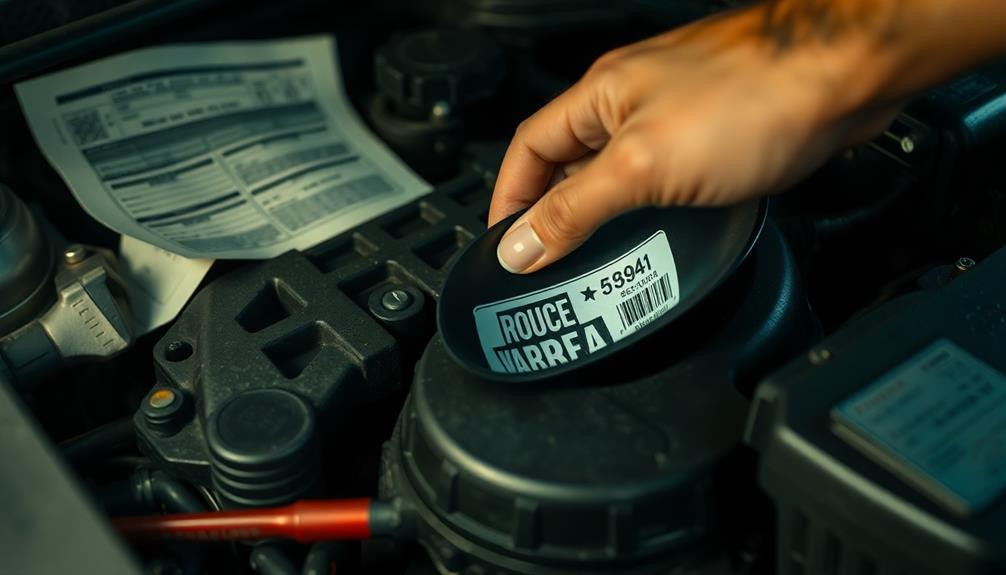
You might be surprised to learn about the secret warranties offered by various automakers, addressing specific vehicle issues.
For instance, Ford extends coverage for EcoBoost engines, while Nissan tackles rear subframe corrosion in older models.
These notable programs and recent warranty extensions can help you keep your vehicle running smoothly without unexpected costs.
Notable Manufacturer Programs
Many vehicle owners remain unaware of the hidden warranty programs offered by manufacturers, which can provide significant benefits.
These secret warranties often cover manufacturer issues that lead to costly repairs. By knowing about these programs, you can access free repairs and save money in the long run.
Here are some notable manufacturer programs you should be aware of:
- Ford's J-67 Program: Covers rust issues in 12 million vehicles, although dealers aren't notified.
- Hyundai's Extended Powertrain Warranty: Available for select models (2010-2021), extending coverage to 15 years or 150,000 miles.
- Subaru's Brake Warranty: Offers coverage for front brake issues on some 2019-2024 Ascent SUVs, but you need to report problems to benefit.
- General Motors' Fuel-Level Sensor Replacement: Free replacements for faulty sensors in 2005-2007 SUVs, valid for 10 years or 120,000 miles.
These hidden warranty programs are designed to guarantee customer satisfaction and protect against manufacturer issues, so don't miss out on potential free repairs! If you’re experiencing problems like your AC not blowing cold air, it could be a sign that you qualify for repairs under one of these discreet warranties. Many manufacturers offer coverage for common issues even after the standard warranty period has expired. Be sure to check with your dealer or manufacturer to see if your issue can be resolved at no cost to you!
Always check if your vehicle qualifies.
Specific Vehicle Issues
Hidden warranty programs can address specific vehicle issues that many owners mightn't know about.
For instance, if you own a 2007-2008 Dodge Nitro or 2008 Jeep Liberty, you might experience fuel spitting back. Under Campaign X46, you can have a redesigned fuel tank installed—complete with a lifetime warranty—at no cost.
If you have a 2005-2006 Dodge Charger, Magnum, or Chrysler 300, be aware of potential stalling issues after refueling. Dealers are directed to install redesigned tanks for free under Campaign X53.
For those with Chrysler vehicles equipped with the 5.7-liter Hemi V8 from 2009-2012, you may face defective timing-chain guides. Fortunately, free replacements are available through Campaign 2014 P01.
Owners of 2005-2007 GM SUVs, like the Chevrolet SSR and TrailBlazer EXT, can also benefit from free replacement of faulty fuel-level sensors for up to 10 years or 120,000 miles under Campaign 10054E.
Lastly, if you own a 2006-2011 Honda Civic, warranties cover paint issues and even engine block replacements for specific models under Campaign 10-048.
Don't miss out on these free repairs!
Recent Warranty Extensions
Recent warranty extensions have become a crucial lifeline for vehicle owners facing unexpected issues. These extensions not only provide peace of mind but also enhance customer satisfaction by addressing common problems that arise after the standard warranty period.
Here are some notable examples of recent warranty extensions:
- Ford: Offers an 84-month warranty for specific EcoBoost engines in 2017-2019 models due to high claim rates.
- Hyundai: Extends its powertrain warranty to 15 years or 150,000 miles for select models from 2010 to 2021, tackling long-term reliability issues.
- Subaru: Provides a warranty extension for front brakes on certain 2019-2024 Ascent SUVs, reflecting its commitment to safety.
- General Motors: Offers free replacements for faulty fuel-level sensors in 2005-2007 SUVs for up to 10 years or 120,000 miles.
These recent warranty extensions show manufacturers' responsiveness to customer concerns, ensuring that you can access free repairs when needed.
Navigating Technical Service Bulletins
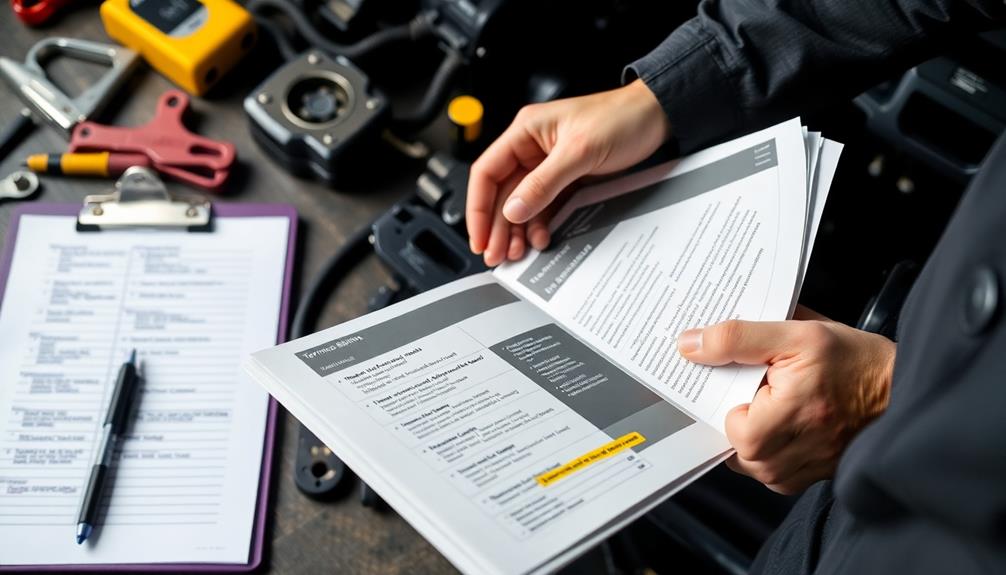
Maneuvering Technical Service Bulletins (TSBs) can be a game-changer for vehicle owners facing issues with their cars. These documents provide vital information about known issues and repair procedures specific to your vehicle model. By accessing TSBs online through the National Highway Traffic Safety Administration (NHTSA) website, you can enter your vehicle's make, model, and year to identify relevant fixes.
Many TSBs contain code words like "goodwill assistance," which can hint at hidden or secret warranties that might allow you to get repairs covered for free or at a discount. Regularly reviewing TSBs can help you quickly diagnose problems, saving you time and reducing labor costs. Dealerships are obligated to address the known issues outlined in these bulletins.
Keeping detailed records of TSBs and any related repairs strengthens your claims for secret warranties, ensuring you're well-informed about your rights regarding vehicle defects. By staying proactive and informed, you can navigate TSBs effectively, making sure your vehicle stays in top shape without breaking the bank.
Don't overlook the power of TSBs; they could lead you to significant savings and peace of mind.
Steps to Claim Your Warranty
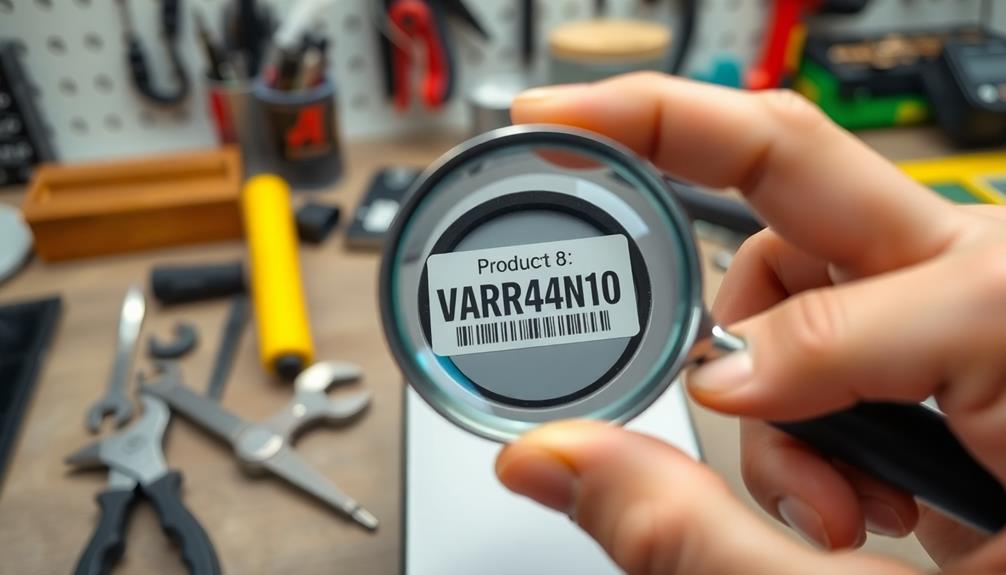
When it comes to claiming your warranty, following a few key steps can make the process smoother and more effective. Start by gathering all necessary documentation to support your warranty claims. This includes your vehicle's identification number (VIN), purchase records, and service history.
Next, do some research on specific makes and models that are known for secret warranties. Check manufacturer websites, online forums, and technical service bulletins (TSBs) for hidden warranty coverage.
After that, reach out to your dealership or the manufacturer directly. Inquire about any eligible secret warranties, and be ready to explain the issues you're facing with your vehicle.
If your initial claim is denied, follow these steps:
- Escalate your request to customer service or management.
- Provide evidence of the defect.
- Reference any relevant TSBs or warranty policies.
- Consider involving consumer protection agencies if needed.
Staying persistent and keeping detailed documentation can greatly strengthen your case, making it easier to resolve any issues with your warranty claims.
Importance of Vehicle History Records
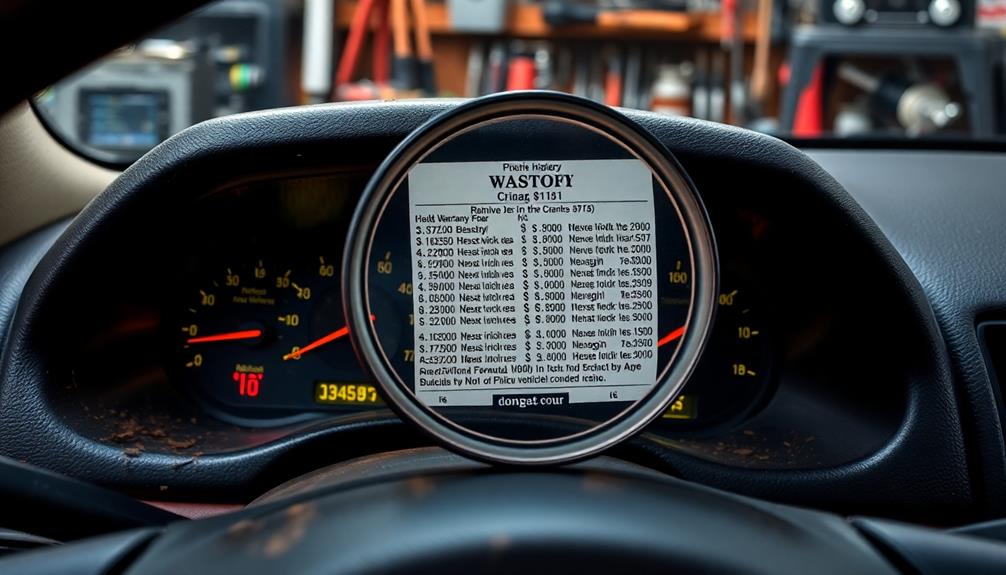
Keeping detailed vehicle history records is essential for your warranty claims and can help you spot hidden issues.
When you document your service history, it strengthens your case when negotiating with dealerships or manufacturers.
Plus, having organized records can uncover potential hidden warranty coverage that you mightn't be aware of.
Documenting Service History
Documenting your vehicle's service history is crucial for maximizing your chances of accessing hidden warranty benefits. A thorough record can greatly enhance your eligibility for secret warranties, especially when it comes to service campaigns. By maintaining detailed documentation, you not only track maintenance but also strengthen your position in discussions with manufacturers.
Additionally, understanding how Louisiana Alimony Laws can impact financial stability post-divorce can help you plan better for unexpected expenses related to your vehicle.
Here are four key reasons to keep accurate records:
- Proof of Maintenance: Manufacturers often require evidence of routine maintenance to validate warranty claims.
- Timeline of Repairs: A detailed log of repair bills establishes a timeline that could be crucial for claiming warranty extensions.
- Identifying Issues: Vehicle history records can reveal past issues that align with known defects, supporting your case for free repairs.
- Leverage in Denials: If your warranty claim is denied, a well-documented service history can provide leverage in discussions with dealerships or manufacturers.
Supporting Warranty Claims
Accurate vehicle history records play an essential role in supporting warranty claims. When you maintain detailed documentation of your service and repairs, you create a solid foundation for any claims you may need to file. This documentation demonstrates your commitment to consistent maintenance and highlights any recurring issues that might arise, making it easier to argue for secret warranties or manufacturer goodwill adjustments.
It's vital to keep receipts and records of all maintenance performed, especially for known issues covered under secret warranties. These records can greatly smooth out your interactions with dealerships and manufacturers when seeking repairs.
Additionally, tracking any communications regarding your warranty claims can serve as valuable proof if disputes arise about coverage.
Ultimately, a well-maintained vehicle history record is instrumental in managing warranty claims. It empowers you to advocate for yourself, especially when manufacturers may not disclose all available warranty options.
Identifying Hidden Issues
How can you uncover hidden warranty options that might be available for your vehicle? The key lies in maintaining detailed vehicle history records. By keeping track of all service and repair documentation, you can identify potential hidden warranty claims that may qualify you for free repairs.
Here are some steps to help you uncover these options:
- Document Everything: Keep a record of all repairs and maintenance. Manufacturers often require proof of your vehicle's service history to support claims for hidden warranties.
- Check Technical Service Bulletins (TSBs): Look for TSBs relating to your vehicle. These documents can highlight known issues that might be eligible for hidden warranty repairs.
- Research Recalls and Warranty Extensions: Investigate any recalls or warranty extensions for your vehicle's make and model. Many of these options aren't widely publicized.
- Utilize Online Resources: Join automotive community forums and use online resources to gather insights about hidden warranty programs associated with your vehicle history.
Legal Protections for Consumers
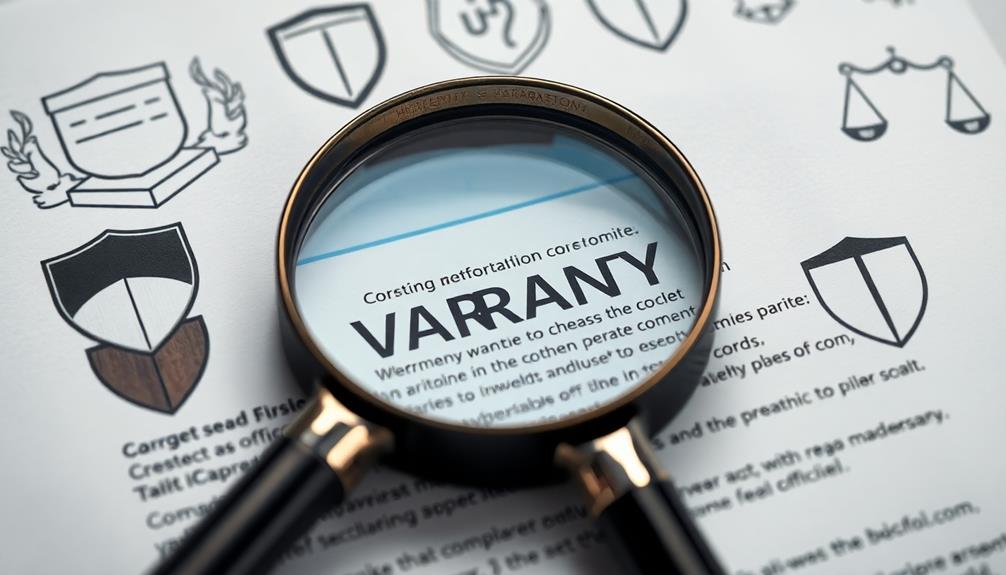
When it comes to understanding your rights as a consumer, legal protections are vital in maneuvering the complexities of warranties. The Magnuson-Moss Warranty Act plays a significant role by mandating that manufacturers clearly disclose warranty terms. This act guarantees you have specific rights regarding consumer warranties, including hidden warranties, which mightn't be immediately apparent.
If you encounter unresolved mechanical defects in your vehicle, lemon laws are in place to protect you. These laws can entitle you to remedies like replacements or full refunds.
Additionally, five states have enacted laws requiring manufacturers to disclose warranty adjustments, enhancing transparency and your overall consumer protection.
Organizations like the Center for Auto Safety advocate for your rights by monitoring undisclosed defects and pushing for legislative changes aimed at improving warranty disclosures.
If you face challenges with warranty claims, seeking legal assistance is highly recommended. Consumer protection attorneys can help you navigate issues related to hidden warranties and guarantee manufacturers comply with applicable laws.
Challenges in Warranty Disclosure

Despite the legal protections in place, many consumers still face significant challenges in warranty disclosure. One major issue is the absence of federal laws requiring auto manufacturers to disclose secret warranties. This lack of regulation leaves many consumers unaware of available repair options for vehicle defects. In fact, only five states have laws mandating warranty disclosure, which means countless consumers are left in the dark.
Here are four key challenges you might encounter regarding warranty disclosure:
- Limited State Laws: With only a few states enacting warranty disclosure laws, many consumers miss out on crucial information.
- Abandoned Regulation: The Federal Trade Commission's attempts to regulate secret warranties were abandoned, allowing manufacturers to hide important details.
- Technical Language: Technical service bulletins (TSBs) often contain coded language about warranty coverage that's difficult for consumers to understand.
- Historical Precedents: Past cases, like the Center for Auto Safety's lawsuit against Toyota, reveal ongoing challenges in accessing warranty information.
Understanding these barriers can empower you to seek out hidden warranties and guarantee you get the repairs you deserve.
Advocating for Consumer Rights
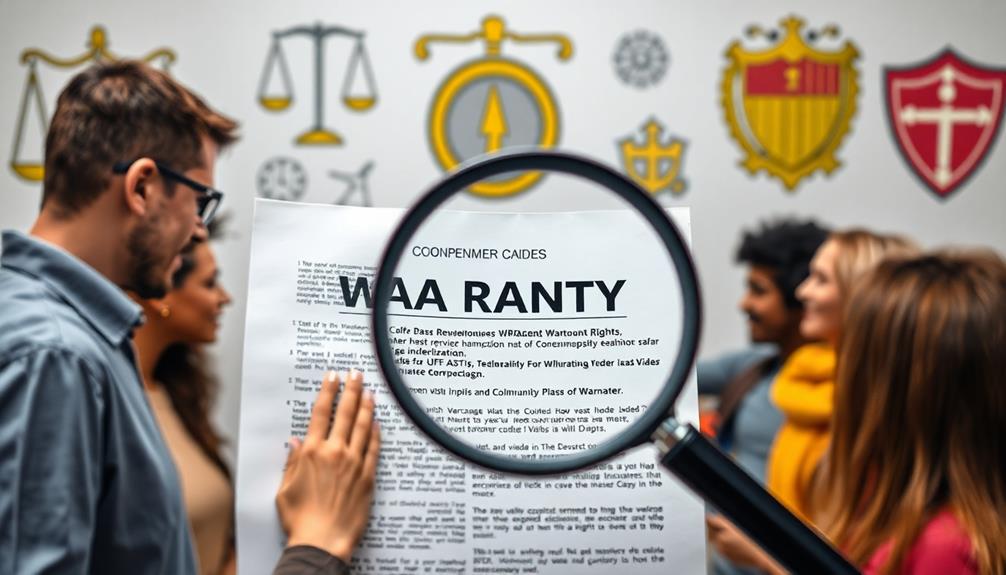
Consumers' rights in the domain of auto warranties are often overlooked, making advocacy indispensable. Many manufacturers keep secret warranties under wraps, but knowing your rights can help you access free repairs even beyond standard warranty periods. Advocacy efforts have led to new legislation in five states that require manufacturers to disclose these adjustments, increasing transparency for you as a customer.
The Magnuson-Moss Warranty Act plays an important role here, mandating clear disclosure of warranty terms. This guarantees you're informed about your rights and coverage options. Organizations like the Center for Auto Safety actively promote awareness of these hidden warranties, pushing for enhanced consumer protections against undisclosed defects.
If you encounter issues with your vehicle, it's essential to document everything. Don't hesitate to escalate your warranty claims; persistence is key in asserting your rights.
Remember, while warranties may require specific actions or documentation, your determination can lead to significant benefits. By advocating for your rights and staying informed, you can access the free repairs you deserve and hold manufacturers accountable.
You're not just a consumer; you're an empowered advocate for change in the auto industry.
Frequently Asked Questions
What Is the Secret Warranty Law?
The secret warranty law isn't officially recognized, but some states require manufacturers to disclose warranty adjustments. If you experience issues, it's best to ask directly about any potential undisclosed warranties that might apply.
What Is Hidden Warranty?
You might not realize it, but hidden warranties exist, offering free or discounted repairs long after standard coverage ends. These undisclosed promises can save you money, but you have to know where to look.
Are Warranty Repairs Free?
Yes, warranty repairs are usually free for defects covered by the manufacturer. You'll need to provide documentation like purchase records and service history to claim these repairs, so keep your paperwork organized.
What Is Warranty Code?
A warranty code's a specific designation from manufacturers that helps track warranty claims and repairs. By understanding these codes, you can identify covered issues and potentially save money on repairs related to your vehicle.
Conclusion
In your quest for the truth behind hidden warranties, remember that like a modern-day Sherlock Holmes, you hold the power to uncover secrets that can save you money and hassle. By staying informed and vigilant, you can navigate the labyrinth of technical service bulletins and vehicle history records. Don't let challenges deter you; advocate for your rights and guarantee your vehicle gets the care it deserves, transforming potential pitfalls into opportunities for peace of mind.









